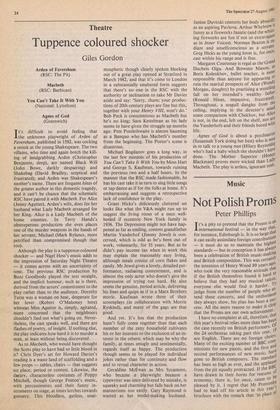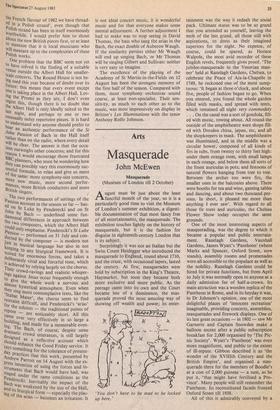Music
Not Polish Proms
Peter Phillips
It's a pity to pretend that the Proms is an international festival — in the way that' for instance, Edinburgh is. It is so large that it can easily assimilate foreign contributions — it must do so to maintain the highest standards — but in conception it has alwaYs been a celebration of British music-making and British composition. This was certainlY the intention of Henry Wood 89 years ago' who took the very reasonable attitude that if the British themselves found it hard in believe that they had any musical talent' , everyone else would find it harder. In judge from the number of people who at' tend these concerts, and the enthusiast° they always show, his plan has been a sue' cess. All the more reason to make it clear that the Proms are our own achieverneht. I have no complaint at all, therefore, that this year's festival relies more than has been the case recently on British performers. 01 the 24 orchestras taking part this year. 19 are English. There are no foreign choirs. Many of the exciting number of BBC corn; missions for new pieces, and the first and second performances of new music, have, gone to British composers. The standard has been as high as ever, and the aciPlatts,e . from the pit equally protracted. If the BBL, have drawn in their horns for reasons 01 economy, there is, for once, cause to he pleased by it. I regret that Mr Ponsonby had to lead off his article in this year Sr brochure with the remark that 'in place 0' the French flavour of 1982 we have thread- ed in a Polish strand', even though that Polish strand has been in itself enormously worthwhile. I would prefer him to shout about the new British pieces first, or at least to mention that it is local musicians who will measure up to the complexities of these Polish works,
One problem that the BBC seem not yet
to have solved is the finding of a suitable venue outside the Albert Hall for smaller- scale concerts. The Round House is not be- ing used this year because of doubt over its future: this means that every event except one is taking place in the Albert Hall. Lov- ing the Proms as they are, I don't even regret this, though there is no doubt that the Albert Hall is only ideally suited to the last night, and perhaps to one or two unusually noisy repertoire pieces. It is hard to understand why anyone should prefer to hear an authentic performance of the St John Passion of Bach in the Hall itself rather than on the radio, where every detail will be clear. The answer is that the occa- sion outweighs other concerns; and for this reason I would encourage those frustrated they planners, who must be wondering how
'Bey can possibly vary this enormously suc-
cessful formula, to relax and give us more of the same: more symphony-size concerts, more new music, more second perfor- mances, more British conductors and more British singers.
The two performances of settings of the
Passion account in the season so far — bas- ed on St Luke by Penderecki and on St John by Bach — underlined some fun- damental differences in approach between the two composers, which the Albert Hall Could Passio onnly emhasise. Penderecki's St Luk perpformed on 31 July and con- e ducted by the composer — is modern not Just in musical language but also in not keeping
to any liturgical framework. It is
scored for enormous forces, and takes a deliberately vivid and forceful tone, which is achieved by relying largely on the chorus. Their crowd-ravings and realistic whisper- ings against Jesus occur frequently enough to give the whole work a nervous and almost hysterical atmosphere. Even when they sing more contemplative texts, like the `Stabat Mater', the chorus seem to find restraint difficult, and Penderecki's 'arias' for the soloists — the traditional points of repose — are noticeably short. All this came over very effectively in so large a building, and made for a memorable even- ing. The Bach, of course, despite some dramatic crowd utterances, is still largely designed as a reflective account which should enhance the Good Friday service. It says something for the tolerance of present- day practices that this work, presented by Andrew Parrott on 14 August with the ex- press intention of using the forces and in- struments that Bach would have had, was staged under the same conditions as the Penderecki. Inevitably the impact of the Bach was weakened by the size of the Hall, and its liturgical form — especially the plac- ing of the arias — becomes an irritation. It
is not ideal concert music, it is wonderful music and for that everyone makes some mental adjustment. A further adjustment I had to make was to stop seeing in David Thomas, the bass who sang the arias in the Bach, the exact double of Auberon Waugh. If the similarity persists either Mr Waugh will end up singing Bach, or Mr Thomas will be singing Gilbert and Sullivan: neither is very easy to imagine.
The excellence of the playing of the Academy of St Martin-in-the-Fields on 12 August has been the strongest memory of the first half of the season. Compared with them, most symphony orchestras sound coarse, at least non-specialist. Their sen- sitivity, as much to each other as to the music, was most impressively on display in Britten's Les Illuminations with the tenor Anthony Rolfe Johnson.



































 Previous page
Previous page